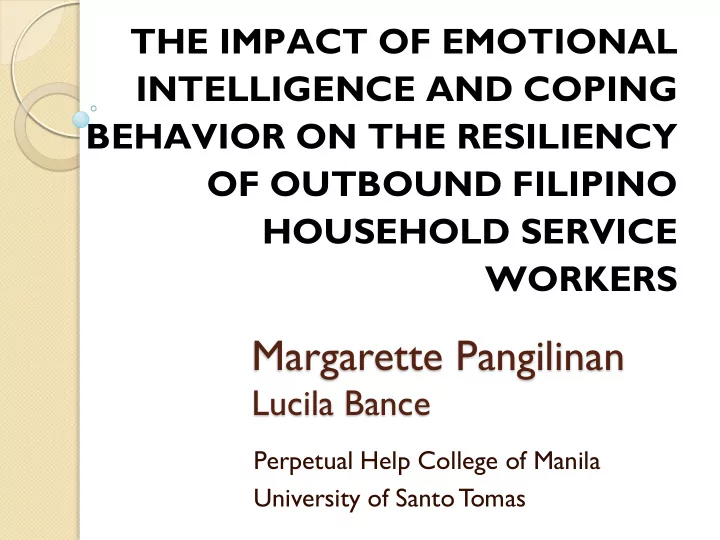

THE IMPACT OF EMOTIONAL INTELLIGENCE AND COPING BEHAVIOR ON THE RESILIENCY OF OUTBOUND FILIPINO HOUSEHOLD SERVICE WORKERS Margarette Pangilinan Lucila Bance Perpetual Help College of Manila University of Santo Tomas
BACKGROUND OF THE STUDY According to the Philippine Overseas Employment Agency (POEA), from 2010-2014 an increase from 1.4 million to 1.8 million Filipinos work abroad. An estimated 880,000 workers are in the Middle East. For 2014 alone, 180,000 are household service workers
In the Pre-Departure Orientation Seminar (PDOS) mandatory seminar for all household service workers working overseas. Some of the possible problems are ◦ Culture Shock ◦ Different Social/Cultural Practices ◦ Gender Issues and Concerns ◦ Isolation ◦ Lack of Political Powers
AIM OF THE STUDY The study would like to know the psychological temperament in terms of emotional intelligence, coping behavior and resiliency of the workers that we send abroad given this reality 4
THEORETICAL FRAMEWORK Richardson’s Resilience Theory • Goleman’s Emotional Intelligence • Model
CONCEPTUAL FRAMEWORK EMOTIONAL INTELLIGENCE RESILIENC Y COPING BEHAVIOUR
RESEARCH QUESTIONS 1. What is the profile of the respondents in the following variables? 1.1 Emotional Intelligence as measured by Work Profile Questionnaire- Emotional Intelligence 1.2 Coping Behavior as measured by Brief Cope 1.3 Resiliency as measured by Connor Davidson Resilience Scale
2. Is there a significant relationship among the following variables: 2.1 Emotional Intelligence and Resiliency 2.2 Coping Behavior and Resiliency
3. What is the impact of Emotional Intelligence and Coping Behavior on Resiliency of outbound Overseas Filipino Workers
HYPOTHESIS H1 There is no significant relationship between Resiliency and Emotional Intelligence among outbound household service workers H2 There is no significant relationship between Resiliency and Coping Behavior among outbound household service workers
HYPOTHESIS H3 Emotional Intelligence is not a significant predictor of Resilience among outbound household service workers H4 Coping Behavior is not a significant predictor of Resilience among outbound household service workers
RESEARCH DESIGN Descriptive-Correlation Design •
DESCRIPTIONS OF THE RESPONDENTS Variable Category Value Percentage Age Minimum 23 Maximum 50 Mean 30 Civil Status Single 55 48.7% Married 53 46.9% Separated 3 2.7% No answer 2 1.8%
DESCRIPTIONS OF THE RESPONDENTS Variable Category Value Percentage Educational Elementary 3 2.7% Attainment graduate High school level 64 56.7% College level 32 28.3% Vocational 8 7.1% course No answer 6 5.3 %
RESEARCH PARTICIPANTS AND LOCALE The participants were selected through purposive sampling. The participants were 113 first timer adult women bound to the Middle East as household service workers.
STUDY MEASURES Brief COPE • Connor-Davidson Resilience Scale (CD- • RISC) Work Profile Questionnaire-Emotional • Intelligence Version (WPQei) Participant’s Information Sheet •
STATISTICAL ANALYSIS Mean • Standard Deviation • Pearson R • Multiple regression analysis •
RESULTS Table 2.1 Profile of the Respondents according to Emotional Intelligence Dimension Mean SD Rank Motivation 28.66 5.70 1 Self-Awareness 28.25 5.41 2 Empathy 26.23 6.02 3 Social Skills 26.16 5.77 4 Intuition 25.81 6.50 5 Emotion 25.65 5.93 6 Innovation 25.46 6.75 7
2. What is the profile of the respondents in the following variables? 2.2 Coping Behavior as measured by Brief Cope
Table 2.2 Profile of the Respondents as to their Coping Behavior Dimension Mean SD Rank Active coping 6.09 1.68 1 Instrumental support 5.35 1.66 6 Planning 5.96 1.56 2.5 Acceptance 5.66 1.63 5 Emotional support 5.27 1.43 7 Humor 5.06 1.56 8 Positive reframing 5.85 1.66 4 Religion 5.96 1.95 2.5 Behavioral disengagement 4.27 1.38 13 Denial 4.51 1.34 11 Self-distraction 4.94 1.68 9 Self-blame 4.41 1.34 12 Substance use 3.16 1.64 14 Venting 4.65 1.33 10
2. What is the profile of the respondents in the following variables? 2.3 Resiliency as measured by Connor Davidson Resilience Scale
RESULTS Table 2.3 Profile of the Respondents as to their Resiliency Statistic Value Minimum 20 Maximum 100 Mean 63.27 SD 18.94 Verbal Description Average
3. Is there a significant relationship among the following variables: 3.1 Emotional Intelligence and Resiliency
RESULTS Table 3.1 Correlation Between Emotional Intelligence and Resiliency Variables Coefficient p-value Innovation .38* .00 Intuition .35* .00 Self-Awareness .15 .11 Emotion .41* .00 Motivation .37* .00 Empathy .24* .01 Social Skills .34* .00 Emotional .41* .00 Intelligence *. Correlation is significant at the 0.05 level (2-tailed).
There is a significant relationship between emotional intelligence and resiliency. With emotional intelligence contributing 17% to resiliency using the coefficient of determination. (r 2 ) 28
3. Is there a significant relationship among the following variables: 3.2 Coping Behavior and Resiliency
Table 3.2 Correlation Between Coping Behavior and Resiliency Variables Coefficient p-value Active coping .41* .00 Instrumental support .32* .00 Planning .47* .00 Acceptance .51* .00 Emotional support .30* .00 Humor .10 .29 Positive reframing .34* .00 Religion .40* .00 Behavioral disengagement .10 .28 Denial -.07 .49 Self-distraction .32* .00 Self-blame .03 .74 Substance use -.35* .00 Venting .06 .52 .50* .00 Coping Behavior *. Correlation is significant at the 0.05 level (2-tailed).
There is a significant relationship between coping behavior and resiliency. With Coping behavior contributing 25% to resiliency using the coefficient of determination. (r 2 ) This support the theory of Richardson on Resiliency that the more stress the person experiences the more the person becomes resilient. 31
What is the impact of Emotional Intelligence and 4. Coping Behavior on Resiliency of outbound Overseas Filipino Workers
RESULTS Table 4 Regression Analysis of Emotional Intelligence and Coping Behavior on Resiliency Unstandardized Model a Coefficients t-value p-value Remarks B SE (Constant) -16.73 11.88 - - - Emotional .96 .35 2.77 .01 S Intelligence Coping Behavior 10.70 2.37 4.52 .00 S a . Dependent Variable: Resiliency
PRELIMINARY CONCLUSION Coping behavior and emotional intelligence impact resiliency. Thus, a program on enhancing the coping behavior and emotional intelligence to impact resiliency of outbound Filipino household service workers is necessary or warranted. The second part of the study will then venture on program development, implementation and determining the efficacy of the program addressing resiliency.
Recommend
More recommend